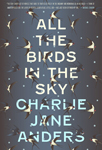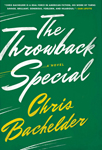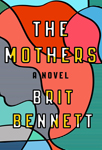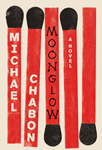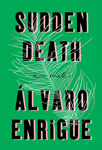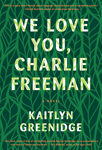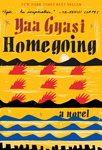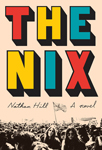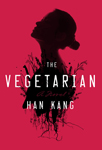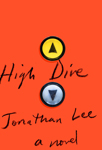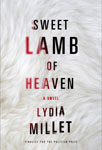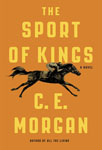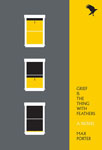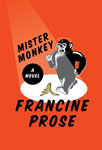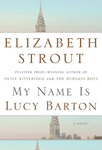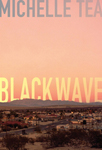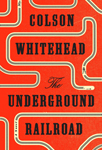by Charlie Jane Anders
Buy it at Powell’s »Miranda Popkey: This is going to sound weird, but: I like my books small and boring. I don’t, to be clear, cherish novels that put me to sleep; I do, however, tend to prefer those slim volumes that focus on the dull and necessary dross that makes up the bulk of lived experience. Even in a crisis (ahem), we still have to put pants on and catch the bus and log into our email accounts and entertain stultifying conversations with oblivious coworkers while steeping tea in the break room. (A caveat: I speak generally, but of course my experience of life has been a specific and privileged—white, straight—one. Crisis can and does overwhelm the mundane, and it may well be thanks to my narrow lens that I continue to believe in the human capacity for pettiness, and joy, and irritation, and boredom, in all but the most dire of situations.) We spend the majority of our time on this rapidly heating planet completing dull tasks while our minds wander, and I admire the novel that can make out of this unpromising material—that is, life—a narrative that nevertheless compels attention. What is Mrs. Dalloway if not a novel about party-planning stuffed with unrelated interior monologues?
All this is to say that from the start, the deck was stacked: Yaa Gyasi’s sprawling, multigenerational Homegoing didn’t stand a chance against Max Porter’s short, anecdotal Grief Is the Thing With Feathers.
Grief Is the Thing With Feathers begins, as its title implies, in the wake of major tragedy: the sudden death of a young wife and mother. But the fragmentary catalog that follows focuses—with a few notable exceptions—on the minor. There are small acts of rebellion: The two now-motherless boys pee on the toilet seat and “never shut drawers. We did these things,” the boys explain, “to miss her, to keep wanting her.” There is anger, misdirected: “My brother and I discovered a guppy fish in a rock pool somewhere,” one boy reports. “We set about trying to kill it.” There is violent frustration at the persistence of quotidian bodily necessity: “Many people said ‘You need time,’” snaps the widowed father, “when what we needed was washing powder, nit shampoo, football stickers, batteries, bows, arrows, bows, arrows.” There is, in the end, the spreading of ashes and the kind of non-resolution resolution that comes with the passage of time.
There is also a crow. The widower is at work on a book entitled Ted Hughes’ Crow on the Couch: A Wild Analysis. (Crow is the poet Ted Hughes’s fourth collection.) In their grief, the widower and his sons are visited by the titular bird. His attempts at comfort are dubious at best (though, to give him his due, they are apparently effective). On his first night in the house, Crow “prised open [the widower’s] mouth and counted bones, snacked a little on his un-brushed teeth, flossed him, crowly tossed his tongue hither, thither, I lifted the duvet.” Crow is, well, an odd bird: sharply observant, linguistically playful, tormented by bad dreams, untethered from even the emotional logic that governs the vignettes of father and sons in mourning. “Krickle crackle, hop sniff and tackle, in with the bins, singing the hymns”: this is the beginning of one of Crow’s nightmares.
My lack of appreciation for Crow is certainly my own fault: If only I loved Ted Hughes (my sympathies were always with Sylvia); if only I’d read Crow. Besides which: The experience of grief is, above all, personal. But Crow’s presence, and its implications, feel less personal—that is, specific—than private—that is inaccessible, and in a way that Porter’s sketches of the father and his boys’ grief does not.
Grief Is the Thing With Feathers foregrounds disaster’s at times unbearably banal wake; Homegoing foregrounds disaster. Yaa Gyasi’s novel travels seven generations across two branches—one enslaved and shipped to the New World; one free but implicated in the British slave trade—of an African, then British and African, then American and African, family tree. Because she gives all of her 16 protagonists standalone chapters, Gyasi necessarily finds each at an often wrenching crossroads. On Africa’s Gold Coast, James Richard Collins, the grandson of a Fante woman and an English governor, contrives to fake his own death in order to marry an Asante woman whose principled stance against African involvement in the British slave trade startles, troubles, and enthralls him. In Baltimore, at roughly the same time, Kojo Freeman, a free black man, searches for his pregnant wife, a free black woman, who he fears (correctly, as it turns out) has been captured by bounty hunters newly emboldened by the Fugitive Slave Act. The inherent drama of these moments is always masterfully evoked; but even so, this means there is little room for the evocation of the everyday against which such drama might play.
This read, at first, as a flaw and, beyond that, as consequence rather than choice: after all, a centuries-spanning narrative needs pointed, poignant, historical signposts. Then I read the chapter devoted to H. H is Kojo’s son, his eighth, born after his wife’s capture and so before the couple decide on a name. (Kojo and his wife, Anna, name their children, in order, after the letters of alphabet.) H is less at a crossroads than he is in the jaws of one. He lives to see freedom, only to be subjected to a second enslavement: picked up by police for “studyin’ a white woman,” he is “chained to ten other men and sold by the state of Alabama to work the coal mines just outside Birmingham.”
The brutality of those coal mines is unrelenting and it is, indeed, a consequence: but of history, not of structure. Years later, free again in a town populated by ex-cons both black and white, H reunites with Ethe, the woman he will marry. She cooks him greens; they fall into each other’s arms. This reads not as a return to life, but as relief from it. Gyasi doesn’t elide the everyday in favor of the exceptional (and the exceptionally painful); she transforms the exceptional, by force of repetition, into the everyday.
This is especially true of the traumas visited on, carried by, the female body. Kojo’s mother, Ness, has been so brutally whipped, “her scarred skin was like another body in and of itself, shaped like a man hugging her from behind with his arms hanging around her neck.” When James’s crops fail, year after year, his daughter Abena wonders “if she herself was a curse, not the untilled land that lay around them, but her own self.” Abena’s daughter, Akua, will burn two of her three children—the girls—alive.
If Grief Is the Thing With Feathers makes the personal private, Homegoing makes the public personal. History weighs heavily on Gyasi’s protagonists. Even after freedom is secured and slavery is abolished and Marcus, great-great-great-grandson to a woman stolen and shackled and raped and shipped to this country against her will, gets into graduate school at Stanford, the memory of exploitation lingers—for the reader, too, even after she sets down her book. It lingers while puts on her pants and catches the bus so she can get to the office where she will log into her email account; it lingers as her mind wanders, as she goes about the boring business of her life.
Match Commentary
By Kelsey Ford & Katherine Kearns
Kelsey Ford: Hi, hi, hi! I have stolen a moment between selling copies of The Alchemist and stealth videoing our store cat, Franny, to be here with you, Katherine, to discuss the outcome of this match, as judged by the inimitable Miranda Popkey.
Katherine Kearns: I’m sitting in my grandparents’ horse-themed guest room, contemplating the meaning of life.
Kelsey: And here we are, together, in this virtual commentators’ booth! As an introduction: Katherine and I are booksellers at Skylight Books, a wonderful indie bookshop in Los Feliz, Calif., right near some great coffee, a great dive bar, and a French restaurant with a killer happy hour on Monday nights. But to get to the verdict: I don’t think either of us were surprised.
Katherine: Yeah, sadly, I don’t think Grief Is the Thing With Feathers had a chance. I thought the concept was interesting, but I wasn’t really feeling the execution. I know you liked it more than I did, Kelsey. What about Grief Is the Thing With Feathers pulled you in?
Kelsey: We should maybe also add that you and I disagree on most things? Other than Justin Theroux. Max Porter’s book hit a lot of sweet spots for me: its exploration of how impossible grief can feel, its slim package, its poetic and jilted language. Initially, I was into the Crow, but eventually, I started agreeing with Judge Popkey on this. The Crow pushed me out of the narrative, even as the family's grief pulled me in. You didn't like the Crow at all, did you K-squared?
Katherine: Haha, that is true. I'm surprised we get along so well! I liked elements of Grief Is the Thing With Feathers, but you are correct: The Crow did nothing for me. I think the story would have worked just as well, or even better, without the Crow. I definitely felt more of a connection to the dad and the boys, and I found myself getting annoyed every time I had to read the Crow’s thoughts.
Kelsey: Miranda blames herself for not appreciating Crow more, as if liking Ted Hughes would help open that door, but I think this is a fault in the book. It’s disappointing for such a beautiful book to require an appreciation for Hughes.
Katherine: It didn’t flow for me, unlike Homegoing.
Kelsey: As soon as I realized what the book was doing, I was all the way in. Miranda says it was the chapter on H that convinced her of what the book was doing, which is interesting! Because that chapter is just about halfway through the book. Although it makes sense, because Miranda did say that Homegoing isn’t typically her kind of book. For me, I bought in almost immediately. Somehow, Yaa Gyasi pulled off the hat trick of making me want to hang out in the current chapter forever, while also so looking forward to reading the next one.
Katherine: I agree. The first half of the book pulled me in and I didn’t want to stop. Each chapter was so well-paced and gave you so much detail. But, as we moved on, each chapter seemed a little more rushed. Toward the end, it felt like a series of vignettes. It lacked what hooked you in at the beginning. Does that make sense, or am I totally off on that one?
Kelsey: Katherine, you’re totally off, and I cannot believe you have that opinion.
Katherine: Hahaha
Kelsey: I’m kidding, I’m kidding! I mostly agree, but by that point, I was all in.
Katherine: I was in too! I really was! And I can forgive the ending. I just wanted that same amount of gusto to carry throughout.
Kelsey: Also though, also. I just want to say, Judge Popkey’s words are such good words. Like, when she writes: “Gyasi doesn’t elide the everyday in favor of the exceptional (and the exceptionally painful); she transforms the exceptional, by force of repetition, into the everyday.” So killer! But anyway. I feel like these two books aren’t as dissimilar as we’re making them out to be. Would you agree?
Katherine: I would agree. At the heart of it, both of these books are family sagas.
Kelsey: They are! Different scales, of course, but two families going through the unimaginable. Or, as Miranda so brilliantly put it: “If Grief Is the Thing With Feathers makes the personal private, Homegoing makes the public personal.”
Katherine: Exactly!
Kelsey: This is probably shouting into the void with this next thought, but, why not: I will say that these two books both felt like a nice antidote to the rage fire I feel in my gut anytime I check the news or log into Twitter.
Katherine: Yeah. It’s weird how relevant each of this books are to what’s going on now. Bringing it back to the private and public, Homegoing chronicles a public history that is still so relevant to what is going on now and Grief captures that private hopelessness that a lot of us are feeling in this current political climate. It’s crazy how well the “rage fire” translates.
Kelsey: Everything is very disheartening, isn’t it? Like how you have the wrong opinion about Dan Stevens. But I feel like here would be a good place to highlight one very encouraging, heartening spot in both of our lives: the resistance work Skylight has been doing since the election.
Katherine: Yes indeed. Even though it seems like we’re living in a dark and uncertain time, it’s brought us closer together as a community. I think this time has made us all more conscientious readers.
Kelsey: That’s exactly right! I’ve been so inspired by our coworkers! There’s a great Current Events Reading Group (that, as a customer put it last night, has been “popping off”). We’ve been raising money for Standing Rock. The morning of the Women’s March, the store closed so the morning staffers could attend. How amazing is that? KK, what else am I missing?
Katherine: I’ve just been having more meaningful and thoughtful conversations with customers as a whole. I now find myself engaging with people who have gone out of their way to buy James Baldwin and Angela Davis or Hillbilly Elegy or White Trash. It’s been fascinating to connect with people and understand and watch their purchasing patterns evolve in both fiction and nonfiction.
Kelsey: It’s meant so much to work at a place that values its staff, its customers, and its role as a place for resistance within the larger community. Part of that is selling books like Homegoing and Grief Is the Thing With Feathers. And another part is discussing Justin Theroux on slow mornings.
Kevin Guilfoile: Thanks to Katherine and Kelsey and Miranda for their outstanding contributions today. I am here only to say that Grief Is the Thing With Feathers does not have enough juice in the Zombie poll to stay in the competition. All the Birds in the Sky and The Vegetarian are proving to be hard to slay as our current Zombie selections.
John and I will be back tomorrow as Catapult editor Nicole Chung bestows her judicial grace on either The Nix or Mister Monkey.



